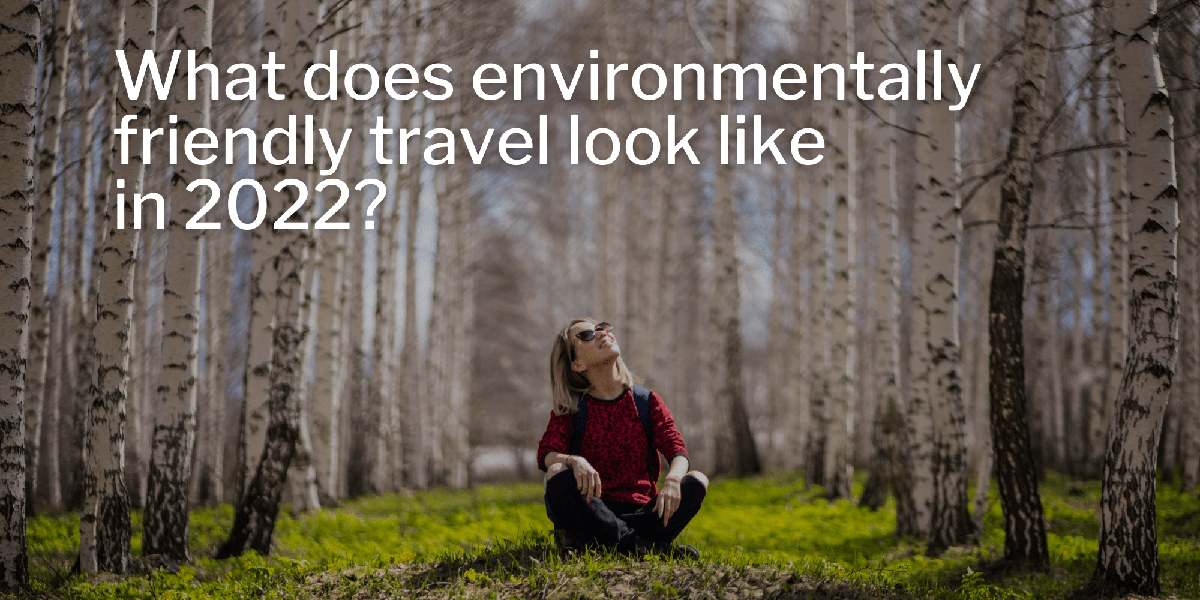Make your tours more enriching with these environmentally friendly initiatives

When it comes to sustainable tourism, perhaps the most well-known and fought-for impacts are the environmental ones. Environmental sustainability is about acting in a way that ensures future generations have the natural resources available to live an equal, if not better, way of life as current generations. Generally, it focuses on the well-being of the overall environment. As a tour operator that specialises in showcasing the beautiful destinations you visit, finding ways you can enrich those destinations is of the utmost importance to the longevity of your business.
This pillar, one of the three pillars of sustainability, focuses on water quality, air quality, and reducing environmental stressors such as greenhouse gas emissions, crowding, and manmade disasters. It also includes both the natural (beaches, forests, waterways) and built environments (ruins, historical buildings).
Here are some key statistics that support the need, and want, for environmental sustainability in tourism:
- 69% of travellers are committed to reducing the carbon footprint of their trip or pay to offset this whenever possible.
- By 2030, global transport-related CO2 emissions from tourism are predicted to grow by 25 percent from 2016 levels
- 79% of travellers want to use more environmentally friendly modes of transport (i.e. walking, cycling or public transport over taxis or rental cars).
- 84% of travellers want to reduce general waste on future trips.
- 35% of travellers would like to see travel companies offering tips on how to adopt better practices while traveling.
- Tourism is responsible for roughly 8% of the world’s carbon emissions.
Although the evidence is clear, as a tour operator business owner, it can be difficult to know where to start when it comes to incorporating earth-conscious practices into your business. To help get you started we’ve outlined some initiatives that your tour operator business can take to adopt environmental sustainability in 2022 and beyond.
Choose your modes of transportation carefully
The amount of emissions released from transportation is one of the major factors contributing to climate change. As a tour operator, your company has the chance to help by promoting more eco-friendly transportation choices.
If your customer doesn’t need to fly to their destination, they shouldn’t. Taking a train is a great alternative whenever possible. But if they do need to fly, it’s best to avoid flying too many short distances in a row. Out of all the different modes of transport, short distance aviation causes the most pollution per kilometre, therefore, you can reduce your emissions by booking a non-stop flight. Another great tip is to consider booking your guests’ seats in economy class. The seats may be smaller, but they have a smaller carbon footprint than business class, making them a more environmentally responsible choice. If economy isn’t an option, be sure to explore your carbon offset options to further minimise the impact.

Choose more efficient transportation when exploring the destination
Reaching the destination is just the beginning. Now that they are there, your travellers are going to want to do some exploring. Instead of hiring a driver or renting a car for them, offer more earth-friendly options such as public transportation. This includes riding the subway, hopping on the bus or taking a streetcar. However, it’s important to remember that the efficiency of public transport modes can vary from one destination to the next. While many cities utilise bus and rail systems that are powered by cleaner fuels or alternative technologies, others still run on diesel or natural gas. And if you’re travellers are up for a more active experience, they can spend the day exploring by bicycle or on foot. By offering these alternative modes of transportation, tourists will gain a more immersive and authentic travel experience.
Consider the size of your group
Consider the size of your tour groups when planning walking or sightseeing tours. A small number of people travelling at a time has less impact on vegetation and animals than hundreds of people visiting at once. This also leaves more space for genuine interaction with local communities. If it is not possible to cut down the size of your group, it’s important to acknowledge the greater footprint it will leave and how it may impact the host community.
Educate your travellers
A responsible tour operator is all about sharing insights and tips on how their customers can travel responsibly. With that being said, it’s important for tour operators to engage in ongoing training about environmental issues. This allows you to better understand and learn about eco-friendly initiatives so that you can pass it on to your travellers. By offering you advice on reducing plastics, giving back to communities and more do’s and don’ts of the host country, you can help your guests make a positive impact and ultimately take away more knowledge from their experience.

Offset your carbon footprint
Globally, travel accounts for 8% of carbon emissions. Inevitably, there are unavoidable carbon emissions from your travel itineraries that need to be compensated for. This is where carbon offsetting comes into play. Carbon offsetting allows you to compensate for the carbon dioxide and other greenhouse gas emissions you produce by reducing emissions somewhere else.
A way to support this is by getting involved in the range of international programmes and tree planting initiatives from Carbon Footprint Ltd. In addition to reducing carbon, these programmes benefit some of the world’s lesser developed regions, providing healthcare, education and employment opportunities. Sustainable Travel International is another great resource that allows you to calculate your footprint and offers ways to offset your omissions online.
Discourage littering when on a tour
When tourists visit a community, they should leave it in the same condition, if not better. Encourage tourists to make sure that all trash is disposed of properly and that litter is never left behind. The amount of pollution flowing through bodies of water is at an all-time high, which takes away from the natural beauty of the location and puts the animals that inhabit it at risk.
So when planning a tour, take a moment to consider access to bins throughout the journey. When you know access will be limited, make sure to provide other options such as providing your guides with the means to take away rubbish and dispose of it in a more appropriate place.

Get rid of single-use plastics
It is widely known that plastic is highly destructive to the environment, especially when only one use of plastic items is involved. A great and easy start to becoming more environmentally friendly is to eliminate plastic straws from your tours altogether. You can then encourage your customers to bring their own reusable water bottles and provide clean drinking water in reusable containers so everyone can fill up their own bottles. Another great option is to partner with restaurants, suppliers and accommodation providers that actively avoid single-use plastic.
While becoming a more environmentally friendly tour operator can sound overwhelming, the fact that you took the time to read this article is a great start and shows initiative. Don’t be afraid to start implementing small changes at first as they can have profound impacts. And remember, responsible tourism not only helps the environment, but also your bottom line along the way.




